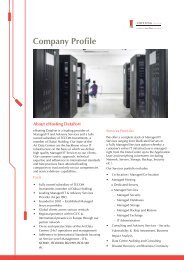Connecting with Cloud by eHDF
a valuable heated debate by eHDF
a valuable heated debate by eHDF
You also want an ePaper? Increase the reach of your titles
YUMPU automatically turns print PDFs into web optimized ePapers that Google loves.
CLOUD COMPUTING<br />
Virtualisation is not<br />
private cloud, and<br />
uptake is not clear,<br />
says Kaul.<br />
Rao: Solutions to<br />
help companies roll<br />
out private cloud are<br />
coming to the fore.<br />
THREE STEPS TO SECURING YOUR CLOUD<br />
1. Define a cloud strategy <strong>with</strong> security in mind<br />
Identify the different workloads and how they need to interact. Which<br />
models are appropriate based on their security and trust requirements and<br />
the systems they need to interface to?<br />
2. Identify the security measures needed<br />
Using a framework allows teams to capture the measures that are needed in<br />
areas such as governance, architecture, applications and assurance.<br />
3. Enabling security for the cloud<br />
Understand the upfront set of assurance measures you will want to take, and<br />
assess that the applications, infrastructure and other elements meet your<br />
security requirements, as well as operational security measures.<br />
“There is no actual data [on private cloud uptake] except<br />
claims <strong>by</strong> vendors that they have sold cloud solutions into the<br />
regional market. These are mostly instances of on-premise implementations<br />
of virtualised environments,” she says.<br />
“A virtual environment is not a cloud implementation unless it<br />
caters to a resource orchestration and automation layer on top of<br />
the virtualised environment. Most times, instances of cloud washing<br />
are claimed as instances of private cloud. However, these are<br />
mostly just highly architected virtualised environments that are<br />
not essentially cloud as they only cater to one specific characteristic<br />
of a private cloud infrastructure, vis scalability and high levels<br />
of utilisation.<br />
“Self-provisioning <strong>by</strong> users, infinite capacity on demand,<br />
shared resources and pooled capacity and ability to pay for use<br />
<strong>with</strong> no commitment may not be present. In absence of these<br />
features, these deployments may not be classified as private cloud<br />
environments,” she states.<br />
Vendors will always aim to offer a variety of solutions in order<br />
to meet wider industry needs, so what are some of the main private<br />
cloud solutions on the market right now?<br />
“GBM offers a private cloud solution based on IBM Smart-<br />
<strong>Cloud</strong> Foundation, which is a family of technologies designed to<br />
help organisations quickly adopt private cloud,” says Pappu Rao<br />
TS & technical support services director, Gulf Business Machines.<br />
“It enables virtualisation, consolidation, automation and management<br />
of service delivery. IBM dynamic scheduling and provisioning<br />
capabilities can deploy dozens of virtual machines in a few<br />
minutes. GBM also offers a private cloud solution based on VMware<br />
v<strong>Cloud</strong> Suite. VMware v<strong>Cloud</strong> Director leverages vSphere<br />
technology to deliver cloud computing. It supports a multi-tenant<br />
environment and provides a self-service portal to provision virtual<br />
resources including server, storage and networking.”<br />
eHosting DataFort’s (<strong>eHDF</strong>) managed private cloud solutions<br />
are targeted towards medium to large enterprises looking at enhanced<br />
and dynamic utilisation of existing infrastructure/applications<br />
in terms of scalability, elasticity and faster time to market.<br />
“In addition to facilitating shared<br />
resources and reduced investments<br />
on hardware, the services will allow<br />
companies to buy capacity-based options<br />
rather than making purchases based on<br />
set specifications — a key imperative for<br />
growing businesses as they move online<br />
and require rapid provisioning,” says<br />
Abraham. “<strong>eHDF</strong> is responsible for implementing<br />
the first private cloud in the<br />
UAE to EMCOR Facilities Services, an<br />
integrated facilities management service,<br />
operation and maintenance solution provider<br />
in the Middle East, North Africa,<br />
and South Asia region. At present <strong>eHDF</strong><br />
is hosting its main business application<br />
Source: IBM<br />
May 2013 ARABIAN COMPUTER NEWS 61





